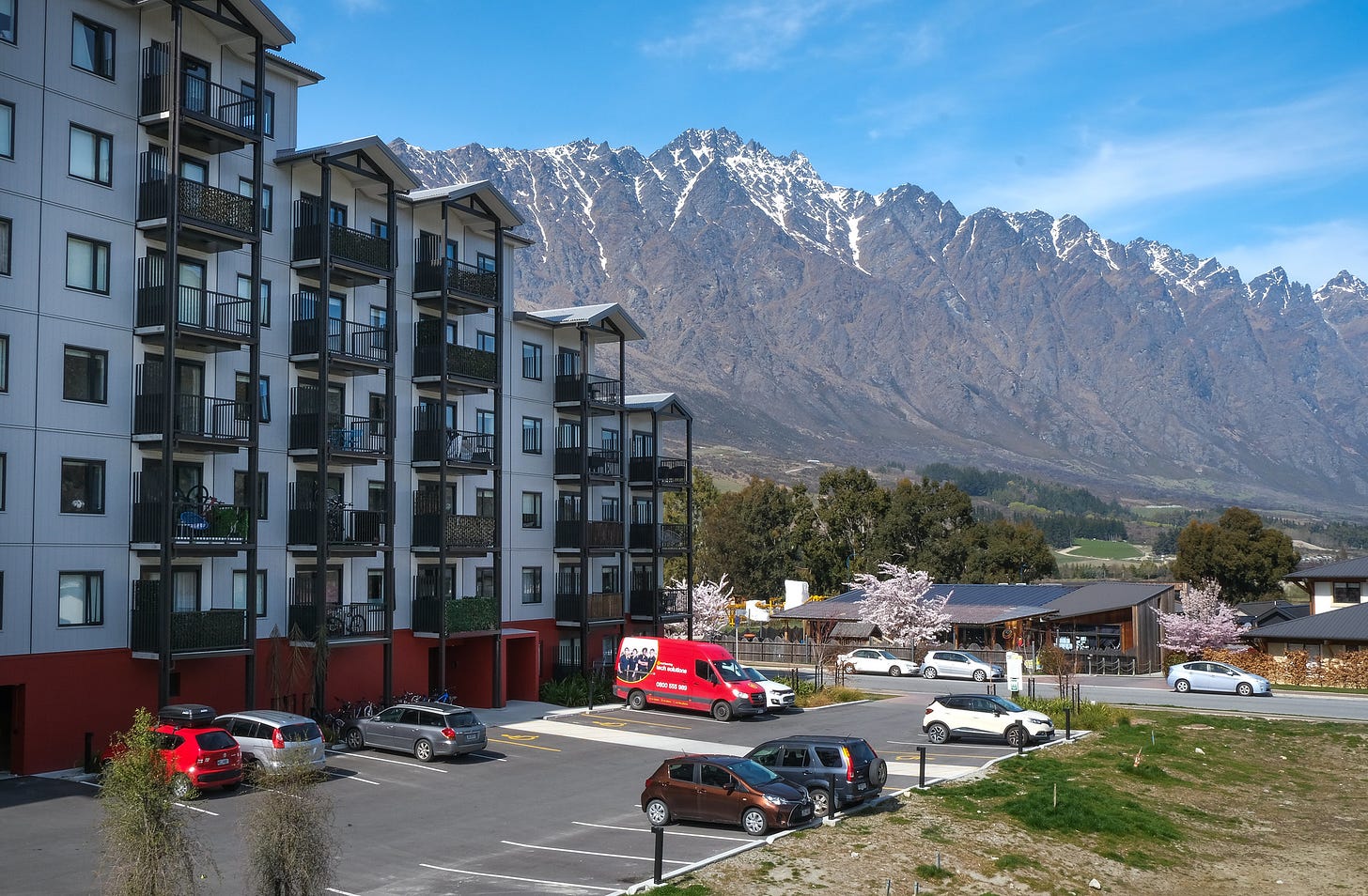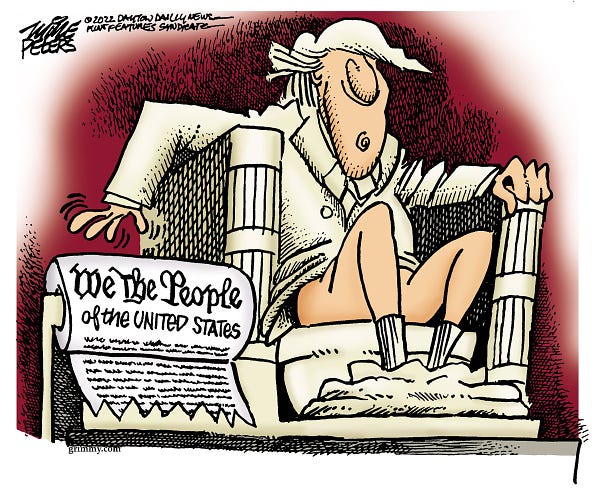TLDR: Councils wanting to encourage the funding of affordable new housing should adopt the approach of the Queenstown Lakes District Council, which has been quietly requiring suburb developers to hand over some of their rezoning profits in the form of land or money to the district’s Community Housing trust to fund over 200 new homes.
The use of this system, called inclusionary zoning or inclusionary housing, is commonplace overseas and looks to be one of the few remaining avenues for central and local Government to tax and redistribute the unearned gains on residential land values from rezoning rural land for housing. Queenstown decision to formally embed the practice in its new District and the upcoming rewrite of all of Aotearoa’s district plans creates a tantalising opportunity for tax reform from the ground up.

I detail at length below the paywall how it has worked in Queenstown and why an imminent decision by the Council there to embed the practice in its District Plan is being watched so closely by other councils. I also look at how it became a topic for a heated and dangerous debate in the local elections in October, and how the Council and Trust are likely to remove its pricklier aspects to preserve the practice. I’m happy to open it up for public consumption later if paying subscribers vote below to do that.
Finally, a way to redistribute unearned land wealth windfalls
Aotearoa’s debates around redistributing the massive and unearned gains in wealth on residential-zoned land in the last 20 years to help solve our housing affordability, poverty and climate crises appear frozen in time for now.
PM Jacinda Ardern’s ‘never in my political lifetime’ stance on wealth and capital gains taxes, the Greens’ lack of leverage over Labour and National/ACT’s long-held opposition to capital or land taxes have closed down the ‘Overton Window’ of debate on this area. Any suggestions that it could be reopened depend on whether The Opportunities Party (TOP) and Te Pāti Māori (TPM) get any or enough power in any Government-forming negotiation to force the window back open. Even that remains impossible while Ardern remains Labour leader and sticks to ruling out taxes on wealth and capital gains, as she did at the 2020 election.
Given the current polls currently show voters want a National/ACT Government in its own right, the chances are fading for any sort of centralised or national attempt to begin wealth redistribution and solve the funding blockages at local Government level.
land owners understand deeply how threatening this idea is to the ‘New Zealand middle-class pakeha way of life’
But there is a glimmer of hope emerging at the local level, led by the Queenstown Lakes Community Housing Trust and its founder, the Queenstown Lakes District Council, which have been quietly operating an inclusionary zoning system since 2003. Inclusionary zoning is a non-threatening phrase to describe the Council requiring landowners benefiting from a zoning change to to hand over a certain percentage of the sub-divided land or a monetary equivalent to a community housing provider to build affordably priced homes for rent or sale. It is a common practice in the United States, the UK and Australia.
It was started by a young American town planner working for the Queenstown Lakes District Council in 2003 called Scott Figenshow, who has since gone on to be a long-serving CEO of Community Housing Aotearoa. Figenshow had seen how effective the practice was in the United States and ensured that the Jack’s Point development was required to put aside around 5% of the rezoned land value for a Community Housing Trust developed specifically for the purpose by the Council.
This practice has been kept going since then, helping to fund the building of homes for 244 families. The inclusionary zoning, or inclusionary housing as the Trust now calls it, has already built 109 homes from the 5% contributions of land or money by developers, with a further 215 in planning or building stages across the district.
The Council decided to formalise the practice in its new District Plan and put a proposal out for consultation earlier this year. However, the proposal as it stands, would actually expand the practice to include ‘Mum and Dad’ redevelopments of large sections into two or three plots for infill housing. Contributions would range from 1% to 5% and also include the triggering of a new contribution when an empty plot is built on.
There’s something in that process of taxing a lottery win that seems to trigger a particular level of outrage.
‘Don’t tax my land. Tax someone else, and something else’
That’s when the trouble started. The issue was picked up in the local election campaign, with some calling the practice a new tax. Here’s an example of the reaction from Kinloch Wilderness Retreat owner John Glover:
“Using the RMA to deliver inclusionary zoning, which is basically a tax, is really quite perverse, and it's actually probably stretching the scope of the RMA...the revenue raising path in the RMA is about cost recovery.
“How does that help with affordability of housing?
“You're not proposing to tax the businesses and the tourism operators...whose rapid growth in the district has been a significant factor underlying the housing shortage.” John Glover via Crux.
Essentially, land owners fearing some of their unearned gains were about to be taken away, said other people and other activities should be taxed, rather than their capital gains on land values generated by rezoning decisions.
They could also see the potential for the practice to spread. One councillor, Nikki Gladding, even opposed the plan on the grounds it would cost a lot of money to defend in the courts once developers challenged it.
“It’s going to go through the courts and we won't get any money out of this, if we ever do, for five, six years...and it's going to take all that time and money to get there.” Nikki Gladding via Crux.
Understanding the sensitivity, the housing trust has suggested paring the Inclusionary Housing contributions back to brand-new and full scale developments to avoid stirring up the hornets nest of outrage from landowners seeing their unearned and unearned gains finally being taxed.
The Trust made a submission last month to the Council asking for the contributions to be wound back to just the big developers.
“We believe the subdivision of an existing single lot into two or three new lots should be encouraged to promote greater land use and infill development in those Urban Zones
“We believe any lot that is existing and serviced at the time the plan change becomes operative should not be required to pay a financial contribution upon the construction of a single residential dwelling, and have suggested an exemption to the rule.
“Although the Trust supports the key principles around large land developers making contributions, it does not support the rules around landowners being subject to a contribution where they have purchased a serviced allotment to build a single residential dwelling, or the proposed “top-up” rule.
“We consider these provisions have gone beyond the original intentions of the policy that landowners undertaking larger subdivisions and developments would be required to make a contribution. As such, we would like to see the policy more aligned with the Stakeholder Deeds and agreements provided since 2003.” Queenstown Lakes Community Housing Trust submission.
The Council is now in the final stages of considering the submissions and are expected to vote on the final form of inclusionary housing/zoning in its District Plan within weeks, or at least early next year.
Why is everyone being so sensitive about a practice commonly used overseas? Because it feels like the thin end of a wedge that might touch the biggest wedge of wealth of all: unearned gains on private land values driven by re-zonings and public infrastructure investment.
We are the only developed economy in the world that does not tax this wealth. No wonder the owners of that wealth feel a little nervous.
Deep down, owners know they don’t deserve it and that if justice was done, that unearned wealth would be redistributed to those who owned the land to begin with and to those that have to rent the land and service the landlord/rentier class.
Why including it in District Plans feels so dangerous (and hopeful)
Being taxed on earnings is painful. But being taxed on a lottery win feels like more like theft, given the ‘Government’ is benefiting from the good fortune for an individual. There’s something in that process of taxing a lottery win that seems to trigger a particular level of outrage.
I actually think land owners understand deeply how threatening this idea is to the ‘New Zealand middle-class pakeha way of life’, which is built around the wealth created out of ‘nowhere’ through land values rising because of land use restrictions, infrastructure underspending and falling interest rates. Then there is the original provenance of the land and how it came to owned by settler families and farmers. Deep down, owners know they don’t deserve it and that if justice was done, that unearned wealth would be redistributed to those who owned the land to begin with and to those that have to rent the land and service the landlord/rentier class.
Why shouldn’t every district plan include inclusionary zoning?
Why the Queenstown situation matters so much
The reason the Queenstown example and situation is so important is that the current RMA reforms could be the vehicle for wider adoption of the Queenstown way. The reforms would see every district plan rewritten to include inclusionary zoning, effectively bypassing the frozen debate at the central Government level.
Why shouldn’t every district plan include inclusionary zoning? Lots of councils are watching Queenstown closely and the RMA rewrites look to be perfect opportunities to adopt the practice more widely.
Two podcasts about inclusionary zoning
I spoke to the Queenstown District Housing Trust CEO Julie Scott about this for my Spinoff podcast, When the Facts Change, a couple of weeks ago.
Also, here’s Community Housing Aotearoa CEO Vic Crockford talking with former CEO Scott Figenshow, and co-founder and managing director of New Ground Capital, Roy Thompson, about the use of inclusionary zoning.
Elsewhere in the news overnight and this morning in our political economy:
Rebates dropped - Fletcher Building announced yesterday it was pulling the tiered retroactive rebates it pays to merchants buying its Gib plasterboard. This came as the Commerce Commission published its final report from its market study of the building materials sector, including a finding the sector was not as competitive as it should be and launching an investigation into the Gib rebates.
Governing alone - Roy Morgan’s monthly political opinion poll for November was published last night, showing combined support for National/ACT up 5.5 percentage points to 50% and support for Labour/Green down seven percentage points from 44.5% in October to 37.5% in November. Labour fell 3.5 points to a record low 25.5%. If those support levels were replicated in next year’s election, National/ACT could govern alone.
A bad batch - Just months after the closure of the Marsden Point refinery, Z Energy warned airlines last night that a bad batch of imported jet fuel meant there may be delays supplying fuel for planes flying out of Aotearoa over the peak Christmas and summer tourism season. RNZ
Substacks of the day
Other useful longer reads and listens


Other places I’ve appeared
I spoke with Jesse Mulligan on RNZ’s Afternoon programme yesterday about the golf course issue. Here it is and below in recorded audio form.
Some fun things


Ka kite ano
Bernard





















Share this post